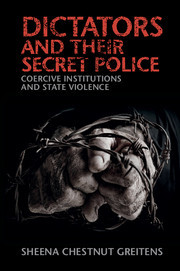Dictators and their Secret Police Coercive Institutions and State Violence Cambridge Studies in Contentious Politics Series
Langue : Anglais
Auteur : Greitens Sheena Chestnut

This book explores the secret police organizations of East Asian dictators: their origins, operations, and effects on ordinary citizens' lives.
How do dictators stay in power? When, and how, do they use repression to do so? Dictators and their Secret Police explores the role of the coercive apparatus under authoritarian rule in Asia - how these secret organizations originated, how they operated, and how their violence affected ordinary citizens. Greitens argues that autocrats face a coercive dilemma: whether to create internal security forces designed to manage popular mobilization, or defend against potential coup. Violence against civilians, she suggests, is a byproduct of their attempt to resolve this dilemma. Drawing on a wealth of new historical evidence, this book challenges conventional wisdom on dictatorship: what autocrats are threatened by, how they respond, and how this affects the lives and security of the millions under their rule. It offers an unprecedented view into the use of surveillance, coercion, and violence, and sheds new light on the institutional and social foundations of authoritarian power.
Part I. The Puzzle and the Argument: 1. Introduction; 2. A theory of coercive institutions and state violence; Part II. The Origins of Coercive Institutions: 3. Organizing coercion in Taiwan; 4. Organizing coercion in the Philippines; 5. Organizing coercion in South Korea; Part III. Coercive Institutions and State Violence: 6. Coercive institutions and repression in Taiwan; 7. Coercive institutions and repression in the Philippines; 8. Coercive institutions and repression in South Korea; Part IV. Extensions and Conclusions: 9. Extending the argument: coercion outside East Asia; 10. Conclusion; Appendix. A note on sources.
Sheena Chestnut Greitens is an assistant professor of political science at the University of Missouri. She is also a non-resident senior fellow at the Center for East Asian Policy Studies at the Brookings Institution and an associate in research at the Fairbank Center for Chinese Studies at Harvard University, Massachusetts. Her doctoral dissertation, on which this book is based, won APSA's Walter Dean Burnham Award for the best dissertation in politics and history, as well as Harvard's Richard J. Herrnstein Prize. Greitens' research focuses on East Asia, security studies, and the politics of authoritarian states. Her work has been published widely in the United States and Asia in academic, policy, and media outlets.
Date de parution : 08-2016
Ouvrage de 240 p.
15.2x22.8 cm
Date de parution : 08-2016
Ouvrage de 336 p.
15.6x23.5 cm
Thème de Dictators and their Secret Police :
© 2024 LAVOISIER S.A.S.



